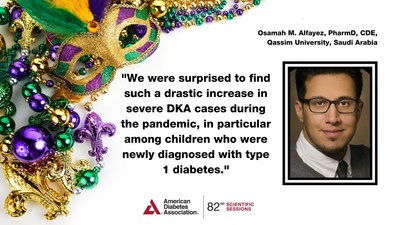|
04.06.2022 17:00:00
|
Risk of Severe Diabetes Ketoacidosis Spiked Among Pediatric Type 1 Diabetes Patients During the Pandemic
Meta-Analysis Compared Rate of Life-Threatening Diabetes Complication Among Children Prior to and During the COVID-19 Pandemic
NEW ORLEANS, June 4, 2022 /PRNewswire/ -- New data presented at the 82nd Scientific Sessions of the American Diabetes Association® (ADA) revealed the incidence of severe diabetic ketoacidosis (DKA) among children with type 1 diabetes was significantly higher during the pandemic compared to pre-pandemic.
DKA is a serious, life-threatening condition that can lead to diabetic coma or even death. While DKA can happen to anyone with diabetes, it is most common among people with type 1 diabetes. DKA is caused by an overload of ketones (chemicals created when fat is broken down for energy) in the blood. When ketones build up in the blood, it becomes more acidic which can poison the body. There are several warning signs of DKA, including thirst or dry mouth and frequent urination.
Researchers conducted a meta-analysis of 18 studies to examine the risk of severe DKA among children with type 1 diabetes during the COVID-19 pandemic compared to prior to the pandemic. Investigators also looked for the risk of severe DKA among children with newly diagnosed type 1 diabetes.
Results revealed severe DKA risk was 76% higher during the COVID-19 pandemic than the pre-COVID-19 period. Among patients with newly diagnosed type 1 diabetes, the risk of severe DKA was 44% higher for people during COVID-19 compared to prior to the pandemic. The bias assessment of the included studies using the Newcastle-Ottawa Scale (NOS) showed that all studies had quality indicators (>7 points).
"We were surprised to find such a drastic increase in severe DKA cases during the pandemic, in particular among children who were newly diagnosed with type 1 diabetes," said Osamah M. Alfayez, PharmD, CDE, Qassim University, Saudi Arabia. "It is imperative that health care providers are educated on the increased cases and there is increased public awareness of the signs and symptoms of type 1 diabetes, as this might play an important role in recognizing the early stage of the disease and seeking medical attention before the medical condition deteriorates to DKA."
Researchers note that severe DKA is a very serious and life-threatening condition in need of prevention strategies and that the significant rise in cases has the potential to place an increased burden on health care systems, especially during the pandemic.
Research presentation details:
Dr. Osamah Alfayez and study investigators presented the findings of the trial during the session listed below:
- Incidence of Severe Diabetic Ketoacidosis among Children with Type 1 Diabetes Mellitus Prior to and During COVID-19 Pandemic: A Meta-analysis
- Presented on Monday, June 6 from 12:00–1:00 p.m. CT
For more information, please contact the ADA Scientific Sessions media team onsite at the Ernest N. Morial Convention Center from June 3–7, by phone at 504-670-4902, or by email at SciSessionsPress@diabetes.org.
About the ADA's Scientific Sessions
The ADA's 82nd Scientific Sessions, the world's largest scientific meeting focused on diabetes research, prevention, and care, will be a hybrid event held June 3–7, 2022 at the Ernest N. Morial Convention Center in New Orleans, LA. Leading physicians, scientists, and health care professionals from around the world will unveil cutting-edge research, treatment recommendations, and advances toward a cure for diabetes. We are eager to get back to safely participating in person and networking with colleagues while hearing the latest scientific advances and groundbreaking research presentations. Learn more and register at scientificsessions.diabetes.org and join the Scientific Sessions conversation on social media using #ADA2022.
About the American Diabetes Association
The American Diabetes Association (ADA) is the nation's leading voluntary health organization fighting to bend the curve on the diabetes epidemic and help people living with diabetes thrive. For 81 years, the ADA has driven discovery and research to treat, manage, and prevent diabetes while working relentlessly for a cure. Through advocacy, program development, and education we aim to improve the quality of life for the over 133 million Americans living with diabetes or prediabetes. Diabetes has brought us together. What we do next will make us Connected for Life. To learn more or to get involved, visit us at diabetes.org or call 1-800-DIABETES (1-800-342-2383). Join the fight with us on Facebook (American Diabetes Association), Spanish Facebook (Asociación Americana de la Diabetes), LinkedIn (American Diabetes Association), Twitter (@AmDiabetesAssn), and Instagram (@AmDiabetesAssn).
Contact: Daisy Diaz, 504-670-4902
SciSessionsPress@diabetes.org
![]() View original content to download multimedia:https://www.prnewswire.com/news-releases/risk-of-severe-diabetes-ketoacidosis-spiked-among-pediatric-type-1-diabetes-patients-during-the-pandemic-301561363.html
View original content to download multimedia:https://www.prnewswire.com/news-releases/risk-of-severe-diabetes-ketoacidosis-spiked-among-pediatric-type-1-diabetes-patients-during-the-pandemic-301561363.html
SOURCE American Diabetes Association
 Der finanzen.at Ratgeber für Aktien!
Der finanzen.at Ratgeber für Aktien!
Wenn Sie mehr über das Thema Aktien erfahren wollen, finden Sie in unserem Ratgeber viele interessante Artikel dazu!
Jetzt informieren!

